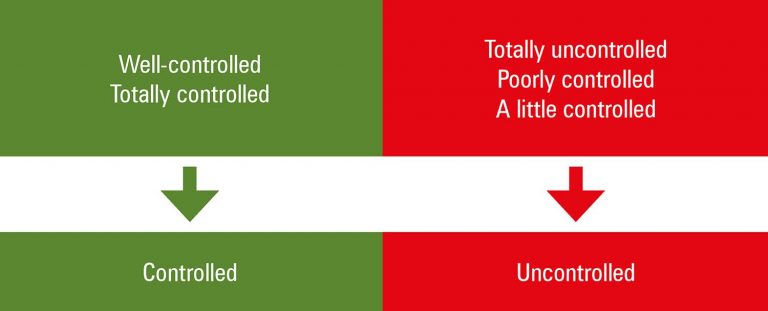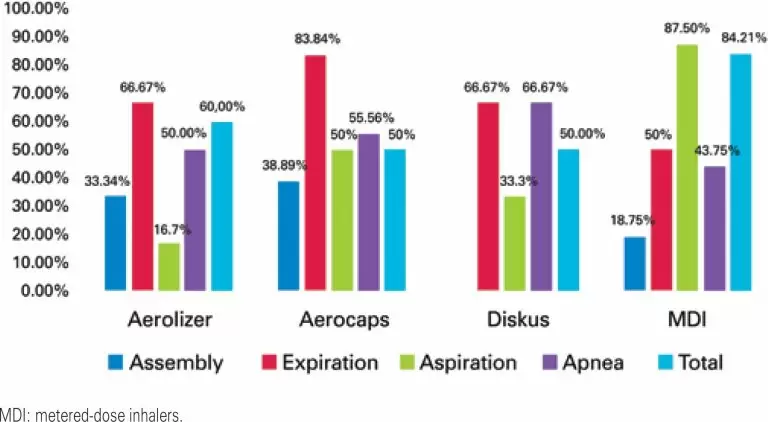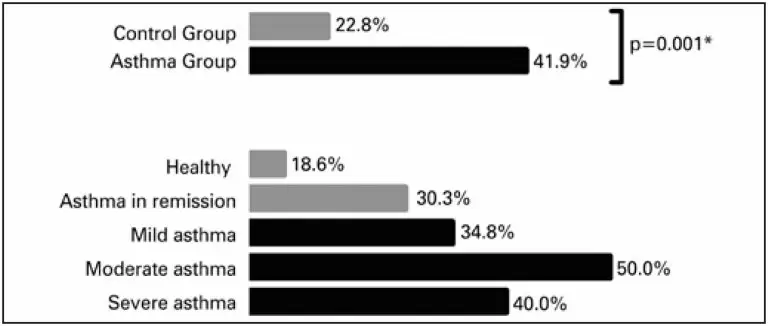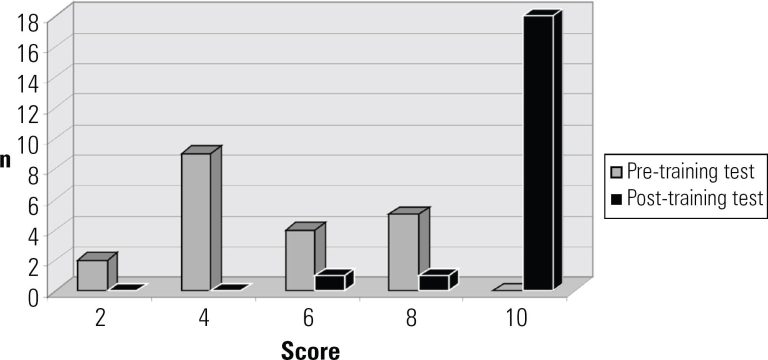Comparison of the effects of high-flow nasal cannula and bilevel positive airway pressure treatments as respiratory physiotherapy interventions for children with asthma exacerbation: a randomized clinical trial
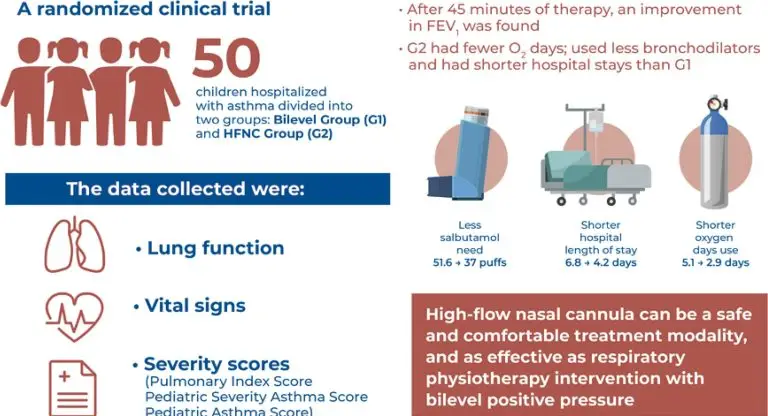
12/Aug/2024
Comparison of the effects of high-flow nasal cannula and bilevel positive airway pressure treatments as respiratory physiotherapy interventions for children with asthma exacerbation: a randomized clinical trial
einstein (São Paulo). 12/Aug/2024;22:eAO0588.
View Article12/Aug/2024
Comparison of the effects of high-flow nasal cannula and bilevel positive airway pressure treatments as respiratory physiotherapy interventions for children with asthma exacerbation: a randomized clinical trial
DOI: 10.31744/einstein_journal/2024AO0588
Highlights Positive airway pressure may improve the severity of asthma exacerbation. A high-flow nasal cannula can improve respiratory physiotherapy outcomes. Positive airway pressure is indicated for moderate asthma exacerbation. Bilevel positive airway pressure and high-flow nasal cannula use may improve the pulmonary function. ABSTRACT Objective: To evaluate and compare the efficacy of high-flow nasal cannula treatment and that of bilevel positive airway pressure treatment as respiratory physiotherapy interventions for pediatric patients who are hospitalized because of asthma exacerbation. Methods: During […]
Keywords: Asthma; Bronchodilator agents; Cannula; Child; Child, hospitalized; Length of stay; Physical therapy modalities; Positive-pressure respiration
17/Mar/2022
Association between beta-2 adrenergic receptor variants and clinical outcomes in children and adolescents with acute asthma
DOI: 10.31744/einstein_journal/2022AO6412
ABSTRACT Objective To investigate whether different genotypes of p.Arg16Gly, p.Gln27Glu, p.Arg19Cys and p.Thr164Ile variants interfere in response to treatment in children and adolescents with moderate to severe acute asthma. Methods This sample comprised patients aged 2 to 17 years with a history of at least two wheezing episodes and current moderate to severe asthma exacerbation. All patients received multiple doses of albuterol and ipratropium bromide delivered via pressurized metered-dose inhaler with holding chamber and systemic corticosteroids. Hospital admission was defined […]
Keywords: Asthma; Bronchodilator agents; Hospitalization; Metered dose inhalers; Nebulizers and vaporizers; Polymorphism, genetic; Receptors, adrenergic, beta-2
08/Feb/2022
Maternal and early childhood factors associated with asthma and obesity in children aged 6 to 7 years: a case control study
DOI: 10.31744/einstein_journal/2022AO5609
ABSTRACT Objective To determine the maternal and early childhood factors associated with asthma and obesity in children aged 6 to 7 years. Methods A case-control study conducted with children aged 6 to 7 years. Applications with questions about asthma symptoms in the last 12 months, maternal and childhood data in the first 2 years of life, and anthropometric data were collected. Children who presented asthma symptoms were considered as cases and those without asthma symptoms were considered as controls, later […]
Keywords: Asthma; Child; Obesity; Overweight
21/Dec/2021
Misperception of poor asthma control in the outpatients clinic of a tertiary hospital in Rio de Janeiro
einstein (São Paulo). 21/Dec/2021;19:eAO6259.
View Article21/Dec/2021
Misperception of poor asthma control in the outpatients clinic of a tertiary hospital in Rio de Janeiro
DOI: 10.31744/einstein_journal/2021AO6259
ABSTRACT Objective To determine the proportion of patients with asthma with misperception of poor control of their disease. Methods A cross-sectional study with a convenience sample of patients with asthma and aged ≥18 years. Asthma control was assessed by the Asthma Control Test and the Global Initiative for Asthma questionnaire. The Kappa coefficient was used to analyze the agreement between the results of these tests and the patients’ perception of asthma control, defined by the response to one question of […]
Keywords: Asthma; Control; Perception; Signs and symptoms; Surveys and questionnaires
23/Jan/2020
Exposure to secondhand smoke among patients with asthma: a cross-sectional study
DOI: 10.31744/einstein_journal/2020AO4781
ABSTRACT Objective To estimate the frequency of secondhand smoke exposure among patients with asthma. Methods A cross-sectional study of asthma patients and non-asthmatic controls using questionnaires to identify secondhand smoke exposure at home, school, work, and public places. Results We studied 544 severe asthma patients, 452 mild/moderate asthma patients, and 454 non-asthmatic patients. Among severe patients, the mean age was 51.9 years, 444 (81.6%) were female, 74 (13.6%) were living with a smoker, 383 (71.9%) reported exposure in public spaces […]
Keywords: Asthma; Environmental exposure; Health policy; Quality of life; Tobacco smoke pollution/adverse effects
29/Oct/2019
Effect of physical activity on asthma control in schoolchildren
DOI: 10.31744/einstein_journal/2020AO4936
ABSTRACT Objective To investigate the effect of levels of physical activity on asthma control in children. Methods A cross-sectional study, including public school students aged 8 to 12 years, of both sexes, with asthma, from a capital and a medium-sized cities in Southern Brazil. At home, the students answered the questionnaire on levels of physical activity and disease control. Results A total of 482 schoolchildren with asthma participated in the study, with mean age of 10.9±2.2 years, and 253 (52%) […]
Keywords: Adolescent; Asthma; Child; Exercise; Sedentary behavior
24/Apr/2019
Most frequent errors in inhalation technique of patients with asthma treated at a tertiary care hospital
einstein (São Paulo). 24/Apr/2019;17(2):eAO4397.
View Article24/Apr/2019
Most frequent errors in inhalation technique of patients with asthma treated at a tertiary care hospital
DOI: 10.31744/einstein_journal/2019AO4397
ABSTRACT Objective: To demonstrate the most frequent errors in inhalation technique in patients with asthma undergoing treatment at a tertiary care hospital. Methods: A cross-sectional study with a convenience sample of asthma patients aged 18 years or over, treated at a pulmonology outpatient clinic of a tertiary care hospital. The assessment of inhalation technique of users of the dry powder inhalers Aerolizer®, Aerocaps and Diskus®, or metered-dose inhalers was based on the manufacturer’s instructions for use of each inhaler device. […]
Keywords: Asthma; Asthma/therapy; Inhalation; Nebulizers and vaporizers/utilization
04/Jul/2018
Levels of knowledge about asthma of parents of asthmatic children
DOI: 10.1590/S1679-45082018AO4204
ABSTRACT Objective To evaluate the levels of knowledge about asthma of parents of school children. Methods A cross-sectional study was carried out with parents of children with medical diagnosis of asthma (mild, moderate and severe), followed up at an outpatient referral center for childhood asthma in the Southern region of Brazil (Asthma Group). Parents of children with asthma in remission and healthy children were also selected (Control Group). The Newcastle Asthma Knowledge Questionnaire (NAKQ) questionnaire was applied in both groups. […]
Keywords: Asthma; Education; Knowledge; Parents; Public health; Pulmonary medicine
01/Jul/2011
Metered-dose inhaler for asthma patients: knowledge and effects of a theoretical and practical guidance for pediatricians
DOI: 10.1590/S1679-45082011AO2115
ABSTRACT Objective: To evaluate the effect of a theoretical and practical guidance on knowledge of pediatricians regarding the use of metered dose inhalers with spacers. To identify major deficiencies, correct them and train these physicians on the correct use of the devices. Methods: Pediatricians who participated in a theoretical-practical program focusing on the use of inhaler devices answered a questionnaire with five questions about the use of these devices before and after the program. A comparison of the scores obtained […]
Keywords: Asthma; Inhalation spacers; Knowledge; Metered dose inhalers


